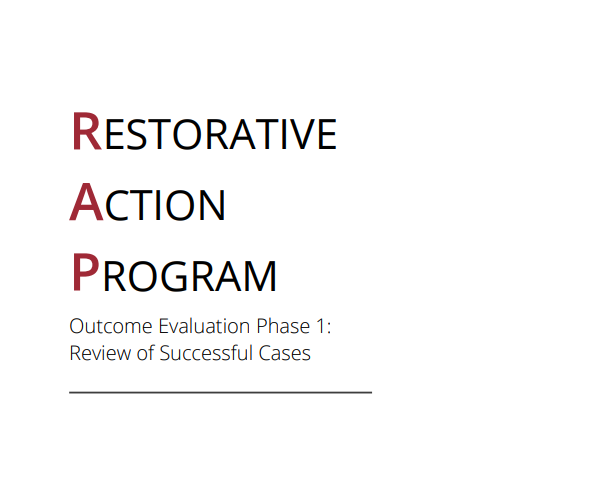
Restorative Action Program Outcome Evaluation Phase 1: Review of Successful Cases
Using a qualitative method, we looked in-depth at what the Restorative Action Program experience is like from the perspective of people who directly benefit from RAP services in their schools. We conducted a series of interviews with people who were identified as having had significant positive experiences with the RAP to learn more about what made the program useful to them and what outcomes they experienced.
By Carolyn Camman with support from Dr. J. Stephen WormithThis report describes and documents the first phase of RAP's outcome evaluation, a qualitative study of RAP 'success cases' using a series of interviews supplemented with program data to gain a better understanding of how RAP helps those who access the program in their schools.
Background
THE RESTORATIVE ACTION PROGRAM (RAP) is a community-based non-profit initiative developed and supported in partnership between the Rotary Clubs of Saskatoon, the Greater Saskatoon Catholic Schools, and Saskatoon Public Schools. RAP currently services nine secondary schools in Saskatoon and has also recently begun expanding to other sites in Saskatchewan and Alberta. The program provides support to students and staff in addressing conflict and bullying in their schools through conflict management and leadership development.
RAP has been in operation since 2003 when it opened in Mount Royal Collegiate. The program has undergone significant development and transformation over that time. In 2010, a partnership was formed with the Centre for Forensic Behavioural Science and Justice Studies at the University of Saskatchewan to evaluate the program's services. A phased approach has been employed to comprehensively assess the program's elements and its effects on young people in Saskatoon.
To date, the evaluation of RAP has included:
- Evaluability assessment to identify RAP's program model and evaluation needs
- Development and implementation of a comprehensive program performance monitoring system to understand and support RAP's program delivery
- Outcome evaluation strategy planning
- Literature review of similar programs and supportive research
Evaluation Purpose
The purpose of the current evaluation is to support the program's development by establishing whether the experiences of its most successful recipients are consistent with the program's expected effects and identifying its most important features as well as areas for change and improvement as the program continues to grow. This particular stage of the evaluation aims to address two central questions:
Q1: Is RAP's program theory supported by recipient experiences?
Q2: What factors are contributing to RAP's successes?

